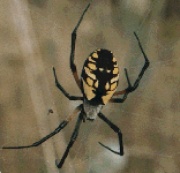Difference between revisions of "Spider"
| Line 4: | Line 4: | ||
An arthropod member of the order of Arachnida. Spiders are distinct from insects in that they have eight legs (not 6) and a two-part body (not 3). About 34,000 species of spiders exist with some on every continent in the world. Spiders spin a strong [http://cameo.mfa.org/materials/fullrecord.asp?name=spider%20silk silk] thread as a snare for their prey. They feed almost entirely on insects. The presence of spiders in a storage area usually indicates that insects are also present. Spiders, however, do not pose major dangers to artifacts themselves. | An arthropod member of the order of Arachnida. Spiders are distinct from insects in that they have eight legs (not 6) and a two-part body (not 3). About 34,000 species of spiders exist with some on every continent in the world. Spiders spin a strong [http://cameo.mfa.org/materials/fullrecord.asp?name=spider%20silk silk] thread as a snare for their prey. They feed almost entirely on insects. The presence of spiders in a storage area usually indicates that insects are also present. Spiders, however, do not pose major dangers to artifacts themselves. | ||
| + | Spider excrement does contain small amounts of uric acid plus, unless removed on a regular basis, it will quickly dry and seal the area from the atmosphere that would otherwise gradually patinate the metal. There are several species of regular indoor 'culprits' but all of them make webs of some sort. | ||
== Physical and Chemical Properties == | == Physical and Chemical Properties == | ||
| − | + | *. Simon Moore, Comment from ConsDistList Global Conservation Forum, August 3, 2023. | |
* Random House, ''Webster's Encyclopedic Unabridged Dictionary of the English Language'', Grammercy Book, New York, 1997 | * Random House, ''Webster's Encyclopedic Unabridged Dictionary of the English Language'', Grammercy Book, New York, 1997 | ||
| − | |||
* ''The American Heritage Dictionary'' or ''Encarta'', via Microsoft Bookshelf 98, Microsoft Corp., 1998 | * ''The American Heritage Dictionary'' or ''Encarta'', via Microsoft Bookshelf 98, Microsoft Corp., 1998 | ||
| − | |||
* ''Encyclopedia Britannica'', http://www.britannica.com Comment: 'spider' [Accessed February 26, 2002]. | * ''Encyclopedia Britannica'', http://www.britannica.com Comment: 'spider' [Accessed February 26, 2002]. | ||
Revision as of 09:56, 4 August 2023
Description
An arthropod member of the order of Arachnida. Spiders are distinct from insects in that they have eight legs (not 6) and a two-part body (not 3). About 34,000 species of spiders exist with some on every continent in the world. Spiders spin a strong silk thread as a snare for their prey. They feed almost entirely on insects. The presence of spiders in a storage area usually indicates that insects are also present. Spiders, however, do not pose major dangers to artifacts themselves.
Spider excrement does contain small amounts of uric acid plus, unless removed on a regular basis, it will quickly dry and seal the area from the atmosphere that would otherwise gradually patinate the metal. There are several species of regular indoor 'culprits' but all of them make webs of some sort.
Physical and Chemical Properties
- . Simon Moore, Comment from ConsDistList Global Conservation Forum, August 3, 2023.
- Random House, Webster's Encyclopedic Unabridged Dictionary of the English Language, Grammercy Book, New York, 1997
- The American Heritage Dictionary or Encarta, via Microsoft Bookshelf 98, Microsoft Corp., 1998
- Encyclopedia Britannica, http://www.britannica.com Comment: 'spider' [Accessed February 26, 2002].
